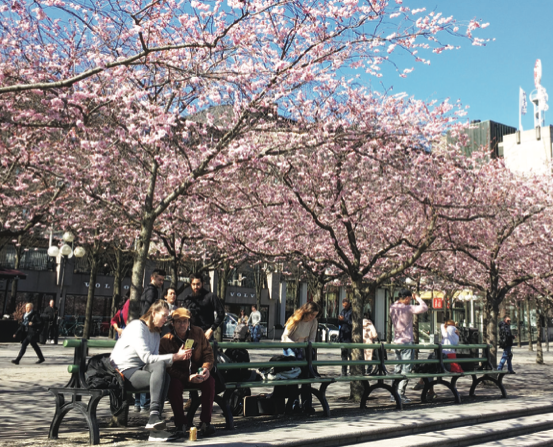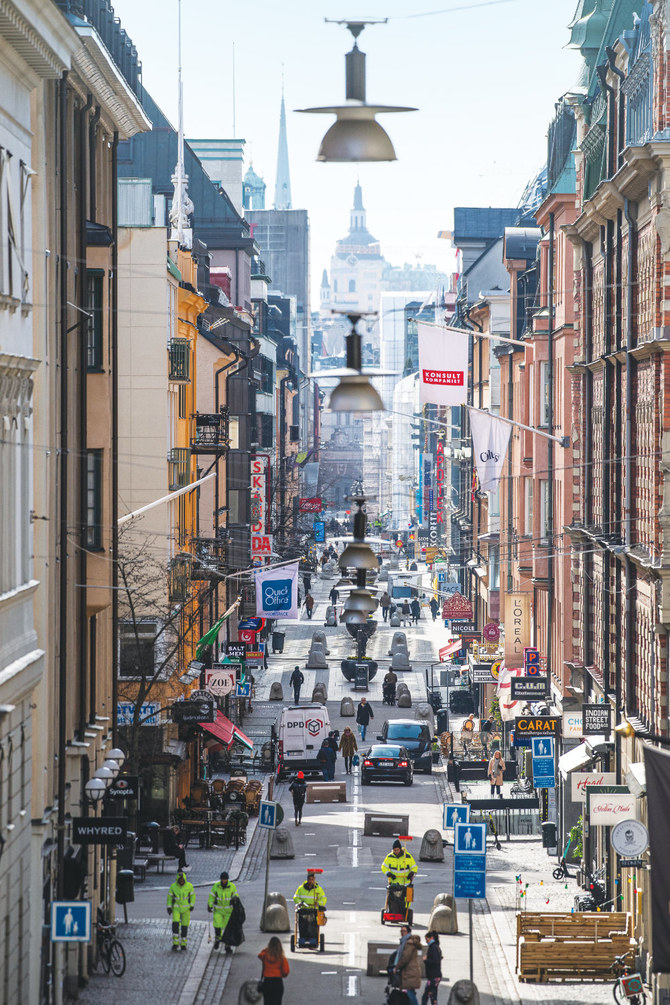STOCKHOLM: France has banned daytime jogging. Britons have been told not to sunbathe. Germany has barred people from forming groups of three or more in public.
In recent weeks, European democracies have curbed a range of personal liberties as they try to limit the spread of the coronavirus disease (COVID-19).
All except for one: Sweden. In the capital of Scandinavia’s biggest economy, people are still free to socialize. In fact, they are encouraged to get out, at least to exercise. Thus, on a recent sunny day, Stockholm’s King's Garden park was full of people taking selfies.
Schools remain open and playgrounds are busy. Sweden’s strategy is largely built on recommendations rather than legally binding restrictions. Stockholm is quieter than usual, but it is far from a ghost town.
“I’m grateful that we are trusted to take responsibility ourselves instead of being put in quarantine like the people of southern Europe,” Gunnel Sjögren, a retired administrator, told Arab News as she soaked up the afternoon sun with a friend in the park.
“It seems to me that most people are acting responsibly.”
At her gym, visitors are few and disinfection of equipment is rigorous, Sjögren said.
She continues to eat out but has started wearing gloves when taking the bus or shopping for groceries.
Johan Giesecke, an epidemiologist who now advises the World Health Organization (WHO), says Swedes will make the right choice.
“People aren’t stupid. If you pass by Stureplan (a popular Stockholm nightspot) at 9 p.m. on a Saturday night, it looks like a nuclear disaster site,” he told Arab News.
“This is not because there are police or a threat of fines or prison. It’s because people understand that they should stay at home.”
INNUMBERS
56% - Swedes with high degree of trust in people.
40% - Share of single-person households.
50 - Public gatherings above which are banned.
10 million - Sweden’s population.
Giesecke said different countries are adopting methods because it is difficult to scientifically assess the efficacy of the precautionary measures being enforced.
“In many countries, politicians want to do something forceful, to show that they are taking action,” he said.
“In Sweden, the reasoning is: If we don’t know that it works, why should we close schools?”
Indeed, Sweden and Iceland are the only two countries in Europe to have bucked the trend of school closures, although all high schools and universities have switched to remote teaching.
Facemasks are still a rare sight in Stockholm. Like in the rest of the world, “social distancing” has become a mantra, but to what extent it is being practiced is open to question.
With Stockholm enjoying some unusually warm days of late, business has been good for cafes that have outdoor seating.
Images of crowded terraces have surfaced in the press and on social media, suggesting that Swedes’ own behavior may not be the most effective way to slow the rate of infection.
Last week, Stefan Löfven, the Swedish prime minister, warned that restaurants that failed to prevent crowding could be closed.
Public gatherings of more than 50 are currently banned, and only seated guests are allowed in restaurants and bars.
As of Sunday, 899 people had died from COVID-19 in Sweden, a country of 10 million people.
The government’s bigger concern is that infections have spread to as many as a third of retirement homes in Stockholm county, the area worst affected.
Swedes over the age of 70 have been advised to avoid social contacts, while visits to facilities for the elderly have been banned.
Those who can work from home are being encouraged by the government to do so and all citizens have been advised to avoid non-essential travel.
Unsurprisingly, Sweden’s approach to dealing with the pandemic has attracted the attention of the world.
A French newspaper has mocked Sweden for perceiving itself as “a kingdom of invincible Vikings.”
US President Donald Trump piled on the pressure, saying: “Sweden did that, the herd, they call it the herd. Sweden’s suffering very, very badly.”
Lars Trädgårh, a social historian, said Sweden’s constitution, demographics and national psyche could explain why it was an outlier on the coronavirus issue.
For one thing, the government is constitutionally prohibited from interfering in the affairs of administrative authorities, including the public health agency.
For another, in global surveys of attitudes, Sweden and other Nordic countries stand out when it comes to trust in authorities.

Swedes enjoy the cherry blossoms in the capital, Stockholm. (Photo by Cajsa Wikström)
This trust is noticeable during the current coronavirus crisis, according to Trädgårh.
In a nationwide survey by Novus, a major polling company, 76 percent of respondents expressed “very high or fairly high” confidence in the Swedish public health agency’s handling of the outbreak.
At the same time, the governing party, the Social Democrats, has experienced a surge in polls.
“What others might view as a path to collective suicide, we see as a lot of sense,” Trädgårh said.
Moreover, he points out, Sweden is sparsely populated, with Stockholm its only metropolitan area.
The city has another natural advantage, with the world’s largest percentage of single households.
“We’ve fostered social distancing for a long time,” Trädgårh said.
“For hundreds of years we’ve had small families, combined with strong autonomy between family members.
“The elderly live by themselves or in retirement homes. In a way, we were self-isolated already before the corona outbreak.”
None of this is to say all Swedes approve of the official coronavirus policy.
The argument that a long-drawn-out lockdown would have major economic implications, potentially harming future health care by depriving the state of tax revenue, has stirred controversy.
Critics, who include Björn Olsen, professor of infectious diseases at Uppsala University, accuse the state of playing with human lives.
In an interview with Kvartal, a Swedish magazine, Olsen put it this way: “It’s not enough to appeal to people’s consciences and say that we should all think before we do this or that.
In Sweden, the reasoning is: If we don’t know that it works, why should we close the schools?
Johan Giesecke, an epidemiologist who now advises the World Health Organization (WHO)
“We are still a bunch of individualists and groups are still gathering. Ban it — now — and shut down as much as you can.”
The polarized public discourse is, in some ways, a reflection of the exigencies of the situation.
Even without lockdowns, the economy has been severely damaged. Tens of thousands of Swedes, mostly in the hospitality sector, have lost their jobs or received lay-off notices.
As of Monday, 25,350 people in Sweden had registered for the week with the public employment agency - higher than figures for any single week during the 2008 global financial crisis.
Peter Thulinsson, who works in the construction business, says he intends to patronize the local restaurant while maintaining social distancing - for as long as it stays open.
“We have to remember that there will be life after coronavirus. If we want to have restaurants in business after this period, we have to support them now,” he told Arab News.
“It’s not only about our physical health. There’s also the mental health aspect. We need something to live for.”
















